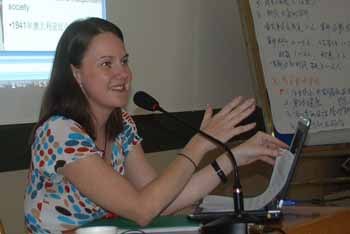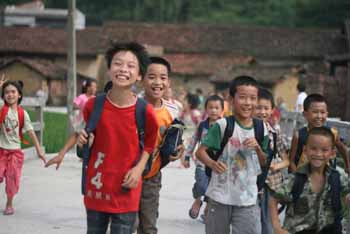 At an awards ceremony in Shanghai, China in November, Ms Jenkinson was named as a finalist in the category of Australian Education International Young Australian Alumni of the Year.
At an awards ceremony in Shanghai, China in November, Ms Jenkinson was named as a finalist in the category of Australian Education International Young Australian Alumni of the Year. Her current role with the Australian Red Cross involves supporting her counterparts at Red Cross Society of China Guangxi Branch with the design and implementation of community-based disaster preparedness activities and disaster risk mitigation measures. The CSU graduate is also responsible for the design and facilitation of the commencement of Australian Red Cross supported Sichuan earthquake recovery programs and supporting Red Cross Community Based Health Care programs in Vietnam as well as liaison and co-operation with stakeholders such as government authorities, International Federation of the Red Cross and Red Crescent Societies, Red Cross Society of China Headquarters and NGOs.
Her current role with the Australian Red Cross involves supporting her counterparts at Red Cross Society of China Guangxi Branch with the design and implementation of community-based disaster preparedness activities and disaster risk mitigation measures. The CSU graduate is also responsible for the design and facilitation of the commencement of Australian Red Cross supported Sichuan earthquake recovery programs and supporting Red Cross Community Based Health Care programs in Vietnam as well as liaison and co-operation with stakeholders such as government authorities, International Federation of the Red Cross and Red Crescent Societies, Red Cross Society of China Headquarters and NGOs. Ms Jenkinson has also worked in the Australian Embassy Immigration Section, Beijing, China from 2000 to 2003; Kham Aid Foundation, Beijing and Sichuan, China from 2004 to 2006; and the United Nations Development Program in the Tibet Autonomous Region, China in 2007.
- What is your daily work routine?
I spend about 70 per cent of my time in the office, working together with my Red Cross Society of China counterparts. I support them with the day to day running of the program, provide formal and informal training on all aspects of Disaster Preparedness and Program Management and liaise with Australian Red Cross Headquarters. The remaining 30 per cent is spent in the field performing monitoring visits with my counterparts to the 17 project sites Australian Red Cross is supporting this year. We travel for a number of hours to reach the country seats where we meet with local Red Cross representatives to discuss progress of projects and any challenges they may be facing. Afterwards, we visit our project villages to speak to the villagers about the disaster preparedness, first aid and hygiene knowledge they have gained from the project training and to see how the construction of the disaster mitigation measures has progressed and the benefits these bring. I've also travelled to Sichuan a number of times as I have been involved in the design of Australian Red Cross supported post-Sichuan earthquake programs, as well as visit Vietnam on a regular basis where I am involved in supporting Red Cross Community Based Health Care programs.
- What is the region like where you live and work?
I am based in Nanning, the capital of Guangxi Zhuang Autonomous Region, which is located in southern China, just north of Vietnam. Guangxi is quite a poor region, inhabited by many ethnic minority groups, as well as Han Chinese. While the scenery, especially the limestone Karst Mountains, is breathtaking, it is also a region regularly affected by natural disasters such as typhoons, floods and droughts. The frequency of natural disasters and the vulnerability of the communities are the main reasons Australian Red Cross is supporting projects here.
- What motivates you to keep working in China?
There are many reasons. As I am fluent in Chinese, I have many opportunities to meet and speak with people from different walks of life from all over China, and to hear their stories and experiences, which I really enjoy. China is so varied, so it never gets boring. Furthermore, the work I am engaged in is extremely rewarding; it's a great feeling to see the gratitude shown by our project beneficiaries when they see the benefits Australian Red Cross-supported projects have brought to their communities. I feel that working here in such a position is a great use of my language and cultural skills, and is leading to greater cooperation and understanding between Australia and China.
- How did your postgraduate studies equip you for such a profession?
My Master of Arts provided me with an excellent basis for understanding and analysing broad humanitarian issues. I gained insight into the many challenges faced by developing countries and their populations as well as improved my ability to consider issues from different viewpoints; a skill which I regularly put to use, and is imperative for working in international environments. I also further improved my research and academic writing skills.
- How did you find your postgraduate studies?
I studied through distance education which was extremely convenient for me. I appreciated being able to receive an Australian postgraduate degree without having to leave my work in China. With the flexible nature of distance education study, I could still fulfil my study commitments without neglecting my work.
- Any words of advice to other CSU students aspiring to work in a similar field?
I would stress the importance of not only acquiring a postgraduate degree in a related field, but also building cultural and language skills, as well as getting practical work experience in your field of interest whenever possible. Speak to people who are engaged in work that you are interested in and ask them about how they got there. Most people are usually more than happy to share such information and advice. Working in international development is very challenging, but also extremely rewarding. If you have the dedication and passion for working hard and helping people, you will get a lot out of it.





Social
Explore the world of social